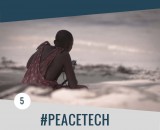The Catalyst for Change
“Tell me the facts and I’ll learn. Tell me the truth and I’ll believe. But tell me a story and it will live in my heart forever.” - Native American Proverb
My father disappeared when I was five months old. Twenty-eight years later, I traveled to Kenya to find him. I placed a one-line “Situations Wanted” ad in a Nairobi newspaper, and within 24 hours—among a population of more than 46 million people—we were reunited. The next day, I found myself on the cover of East Africa’s largest newspaper, and in the days after I was interviewed on several local talk shows.
I went to Kenya to find my father, but I did not know the ripple effect my actions would have on my Kenyan family and the Kenyan Diaspora. Hearing my story moved others to their own reconciliations.
In the weeks and months that followed, I received numerous emails from Kenyans around the world saying they were inspired by my story to find their own lost relatives and reunite with loved ones. My story of faith, forgiveness, and fortitude became a light for people I would never meet.
My story of faith, forgiveness, and fortitude became a light for people I would never meet.
Invigorated by this experience, I returned to the United States one year later, determined to help people share their own stories. Not long after, I began working with StoryCorps, a nonprofit media organization and cultural institution whose mission is to preserve and share humanity’s stories in order to build bonds between people and create a more just and compassionate world. StoryCorps is guided by the belief that the simple act of listening creates stronger human connections. Its signature forty-minute interviews are intimate conversations between two people who know each other well and are inspired by universal themes of family, love, and work. Since its founding in 2003, StoryCorps has featured interviews with more than 105,000 people, partnered with more than 4,000 community-based organizations, and produced nearly 600 broadcasts, heard nationally on NPR.
The scope and power of these stories create the conditions for social change and social justice: increasing tolerance of and respect for all people, and challenging inequality. StoryCorps content has been featured in exhibitions, multimedia performances, advocacy, academic research, documentary filmmaking, and in community health assessments. It is within this framework of listeners, participants, and organizational partners that the role of storytelling in efforts for peace and justice is revealed.
The effects of these stories are real. Evaluations of StoryCorps’ content demonstrate that stories are powerful, not just for participants, but for listeners as well. Stories can validate one’s own experience, increase understanding, develop empathy within the reader, heighten connections, and inspire action. StoryCorps’ interviews, used by organizations, have strengthened long-term community empowerment and contributed to societal cohesion.
Last year, a single innovation forever changed StoryCorps. The organization won the $1 million TED Prize and used the funds to develop and launch a free mobile app that makes the StoryCorps interview experience available to anyone with access to a smartphone. In March 2015, the StoryCorps app debuted, and since then, individuals and organizations have used it to mobilize communities and raise awareness around a spectrum of pressing social issues. For example, a group of community members used the app to record “Voices of Animas,” stories focused on the 2015 Gold King Mine spill into the Animas River, affecting thousands living in Colorado, New Mexico, and Utah.
A StoryCorps colleague recently described the app as a “blank canvas for the world” on which to create new stories, while enabling individuals and organizations to increase their digital presence and preserve stories for future generations. Participating in a StoryCorps interview creates a unique opportunity for people to share their stories with the world. One StoryCorps participant who is a Director of Community and Program Services at a health facility noted, “These interviews brought meaning and dignity to the lives of our patients and their families. The CDs that are preserved at the Library of Congress will bring wisdom and insight to future generations about how those who are dying are also living and filled with important things to say.” Additionally, a student of StoryCorpsU, a youth development program, said of their experience, “I learned how to speak loud and brave so people can know I have a voice and that everyone’s voice matters.” StoryCorps continues to improve access to experience, works to become more inclusive, and aims to continue bringing key social issues of diverse communities to public attention. StoryCorps works to deepen connections to community and increase individual self-worth—especially among members of historically marginalized or disadvantaged populations.
Across every culture, in every part of the world, humans have told stories to understand, share, and recall knowledge. We are like human kaleidoscopes—reflections of the people we encounter and the environment that shapes our experience. When I shared the story of finding and reuniting with my father in 2010, I did not know the impact I would have on others. When StoryCorps participants record and share their stories, we cannot always foresee the impact it will have.
What I have learned through this work is that the affect of storytelling and the power of listening is transformative: reaching the heart has a profound ability to change the mind. Through storytelling, by sharing and listening, one of my greatest desires is that humanity can illuminate hope, and reflect back all that is good and peaceful in the world.
My 5 Most Memorable StoryCorps Stories
Miss Devine: James Ransom and Cherie Johnson
Albert Sykes and Aiden Sykes
Traffic Stop: Alex Landau and Patsy Hathaway
Yusor Abu-Salha and Mussarut Jabeen
Paul Braun and Phillip
(Feature Photo Credit: “10022008035” by yaminie10; CC BY-NC-SA 2.0)
(Textbox background photo:Earth from the ISS: English Channel by NASA’s Marshall Space Flight Center; CC BY-NC 2.0)

